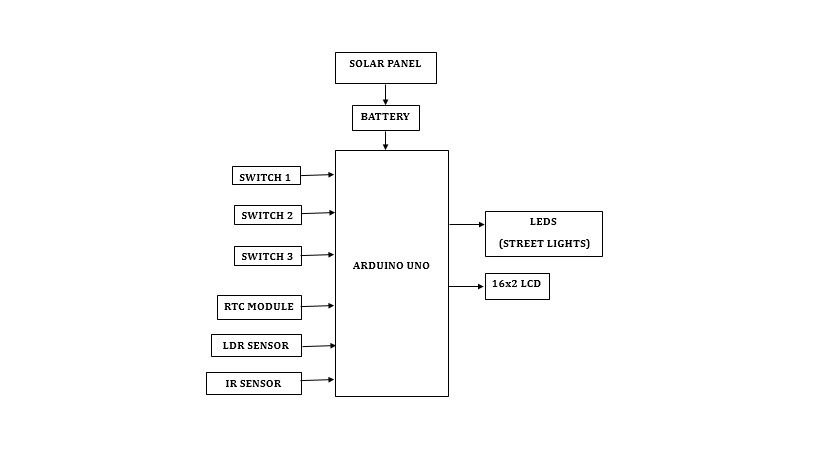Junction Street Light System Automatic Control Using Renewable Energy Resource
Objective
The main objective is switching of street lights in the evening when there is dark using solar energy stored but focuses on switching only when any object/vehicle/public passes by , by using sensors and then is automatically switched on when they are passing.
Abstract
Due to rapidly increase urban sector in India large volume of energy is required for it so the answer is Renewal Energy in form of Solar power which is presently used in urban sector of India whether it’s used for domestic as well as corporate sector. The basic idea of this project is to manage the street light by a programmable micro controller to reducing as well as save the energy, as result the programmable micro controller was engaged to run in two different modes, one is to turn the street lights ON when there is darkness at the set time. Here we are using RTC module for setting the time. And the other is to turn the street lights ON whenever a vehicle is detected.
Keywords: Renewable energy, Street lights, Arduino UNO, RTC.
NOTE: Without the concern of our team, please don't submit to the college. This Abstract varies based on student requirements.
Block Diagram

Specifications
Hardware Requirements:
- ARDUINO UNO
- RTC module
- LDR sensor
- IR sensor
- LEDs
- Solar panel
- Battery
- Push Buttons
Software Requirements:
- ARDUINO IDE
- Embedded C
- Fritzing
Learning Outcomes
- Arduino UNO Pin diagram and Architecture
- How to install arduino IDE Software
- Setting up and Installation procedures for Arduino UNO
- Introduction to Arduino IDE
- Commands in Arduino
- Basics of Embedded C
- How to interface push buttons with arduino?
- Working of RTC Module
- How to interface sensors and RTC with arduino?
- Working of LDR, IR Sensor
- How to interface LDR and IR sensor with Arduino?
- How to interface 16x2 LCD with arduino?
- About Project Development Life Cycle:
- Planning and Requirement Gathering(( software’s, Tools, Hardware components, etc.,)
- Schematic preparation
- Code development and debugging
- Hardware development and debugging
- Development of the Project and Output testing
- Practical exposure to:
- Hardware and software tools.
- Solution providing for real time problems.
- Working with team/ individual.
- Work on Creative ideas.
- Project development Skills
- Problem analyzing skills
- Problem solving skills
- Creativity and imaginary skills
- Programming skills
- Deployment
- Testing skills
- Debugging skills
- Project presentation skills
- Thesis writing skills





 Paper Publishing
Paper Publishing
